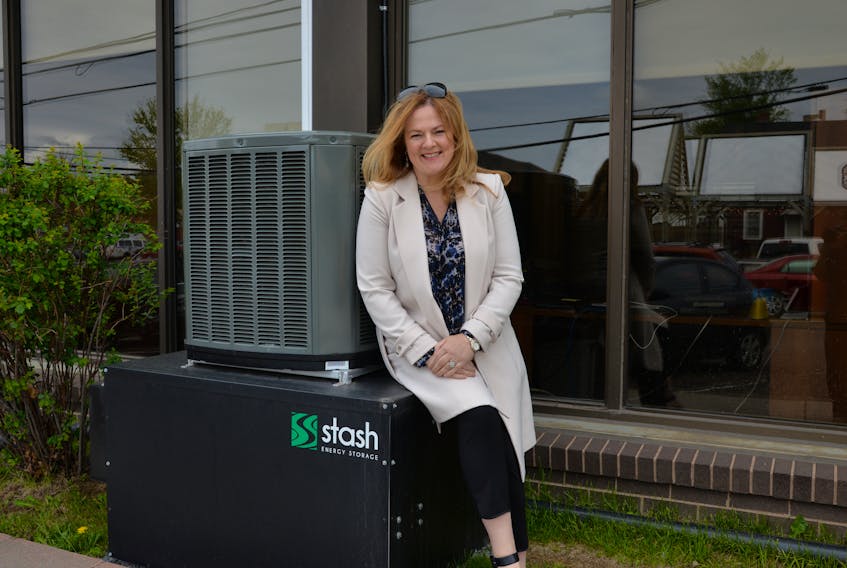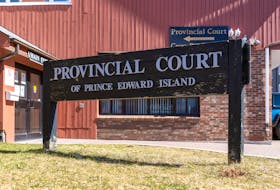CHARLOTTETOWN, P.E.I. - Three entrepreneurs, including one from P.E.I., think they’ve come up with a home heating innovation that will “stash” energy to help homeowners save on energy costs.
“With the uprising of renewable energy, like wind and solar, this is becoming a lot more important and becoming a big concern for utility companies all around the world,” said Jordan Kennie, CEO of the New Brunswick company, Stash Energy Inc. Kennie, Daniel Larsen, chief product officer (from P.E.I.), and Erik Hatfield, chief technical officer, founded the business in 2015 while finishing engineering degrees at the University of New Brunswick.
“How do you store energy when it’s being produced? Because you can’t control when the sun comes out or when the wind blows. I think we’re definitely part of that solution.”
This week, Stash received a $500,000 total investment – comprised of $255,000 from Island Capital Partners, a P.E.I. venture capital fund, and $245,000 from the New Brunswick Innovation Fund – to further develop The Stash M1 Comfort System and eventually bring it to market.
Related: Stash Energy Inc. founders wanted a big problem they could solve
The M1 is a heat pump (similar to a mini split) with the unique capability of storing four hours of heat energy and about one hour for air conditioning using a phase-change material (salt hydrate). The units are being targeted for residential use, but they could also be used for smaller commercial buildings, said Kennie.
Stash plans to make 50 of these units in the fall that will be available to Maritime customers for further testing before taking the product fully to market. Kennie said around 10 units will be available for P.E.I. while the remaining units will be divided between New Brunswick and Nova Scotia.
In the meantime, three of the units are part of a pilot project with Summerside Electric and Maritime Electric to test their storage capacity and work out any bugs before the product is offered to customers.
“We’re just optimistic because whoever gets the storage solution right, it’s going to be a game changer for whatever company in the world can make that happen. So, we’re excited about it. It’s an opportunity to start on a small scale.”
-Kim Griffin
Summerside Electric was the first to invest in Stash ($40,000 in funding and services) in May 2017 for two units installed at the Venture Centre.
Kennie said P.E.I. was a great place to launch the pilot project because of the need for energy storage, especially given the abundance of wind energy on the Island at night when customers are asleep.
“You can store all that excess energy and then use it in the morning when people get up,” he said.
Bobby Dunn, Summerside’s business development and sales manager for the city’s Heat for Less Now program, said using stored energy during the peak times (7 a.m. to 9:30 a.m. and 11:30 a.m. to 2 p.m.) means the units take stress off the city’s grid and save customers money because they’re not using as much energy during those peak times. Non-peak times would allow the units to be used as a regular heat pump and recharge the energy storage.
“That’s a tremendous boost to any utility,” he explained.
Similar to a standard heat pump, Dunn said a home assessment needs to be done to see if the M1 fits as a companion to other heat sources. Heat pumps work well in open spaces but have limited range.
But Stash claims that M1 could save customers money. Kennie said based on Summerside’s pricing structure, the M1 unit can save homeowners up to 70 per cent on a home heating bill compared to baseboards, 54 per cent compared to oil heat, 48 per cent compared to electric thermal storage (ETS) and 29 per cent compared to a traditional heat pump.
Dunn is looking into adding a couple of more units for the Summerside pilot project.
In the meantime, Kennie said the plan is to replace the two Summerside units with newer prototypes similar to the one at Maritime Electric.
In January, Maritime Electric acquired and installed an M1 unit on the side of its Kent and Prince Street building in Charlottetown. The unit is visible on the Prince Street side of the building.
The unit is being used to heat and cool the building’s first floor. There have been some issues with delays, inconsistent heating and collecting data from the unit, said Kim Griffin, spokesperson for Maritime Electric. She said she believes those have since been resolved and she expects data collection has resumed.
Kennie said the issues were part of testing a new smart thermostat system. He said a software developer has resolved those problems.
“We’re just optimistic because whoever gets the storage solution right, it’s going to be a game changer for whatever company in the world can make that happen,” said Griffin. “So, we’re excited about it. It’s an opportunity to start on a small scale.”









